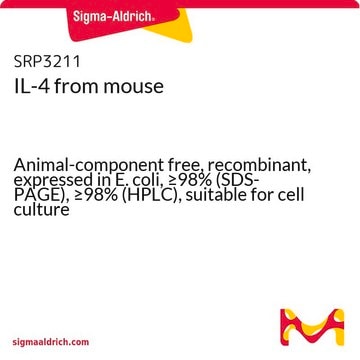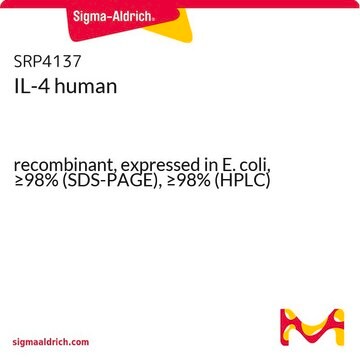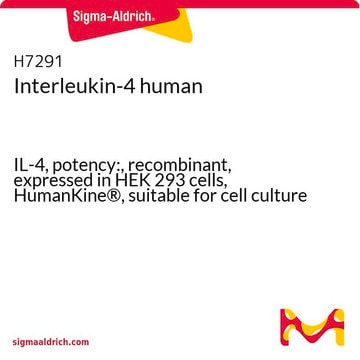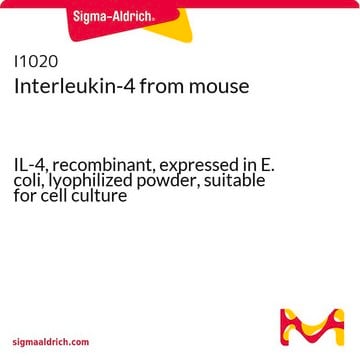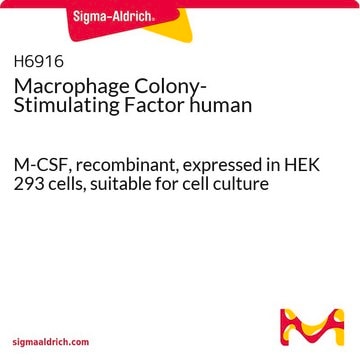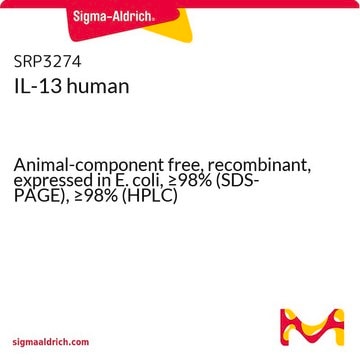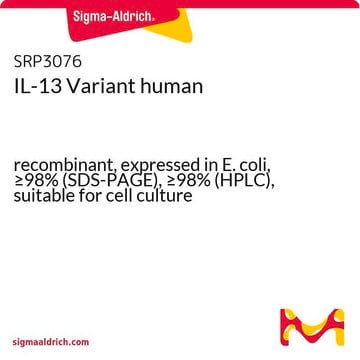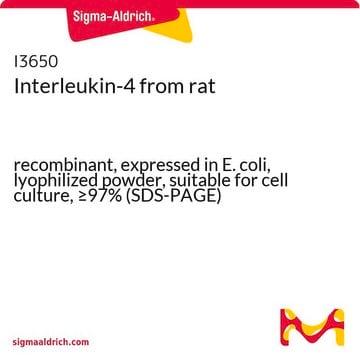I4269
Interleukin-4 human
IL-4, recombinant, expressed in E. coli, lyophilized powder, suitable for cell culture
Synonym(s):
IL-4, hIL-4
About This Item
Recommended Products
biological source
human
Quality Level
recombinant
expressed in E. coli
Assay
≥98% (SDS-PAGE)
form
lyophilized powder
potency
≤0.400 ng/mL EC50
quality
endotoxin tested
mol wt
14.9 kDa (containing 129 amino acid residues)
packaging
pkg of 5 and 50 μg
technique(s)
cell culture | mammalian: suitable
impurities
≤1.000 EU/μg
color
white
UniProt accession no.
storage temp.
−20°C
Looking for similar products? Visit Product Comparison Guide
General description
IL-4 binds to two distinct receptors; the type I receptor, a heterodimer consisting of the IL-4Rα chain and the common gamma chain, γc, and the type II receptor, a heterodimer of IL-4Rα and IL-13Rα1.4
Naturally occurring IL-4 has a molecular mass of 12-20 kDa. Recombinant human IL-4 is a 14.9 kDa protein containing 129 amino acid residues. Human and mouse IL-4 share a 50% amino acid sequence homology, but their biological actions are species-specific.5
Application
Physical form
Analysis Note
Citation
2. O′Garra, A., and Arai, N., The molecular basis of T helper 1 and T helper 2 cell differentiation. Trends Cell Biol., 10, 542-550 (2000).
3. Ryan, J.J. et al., Mast cell homeostasis: a fundamental aspect of allergic disease. Crit. Rev. Immunol., 27, 15-32 (2007).
4. Callard, R.E. et al., IL-4 and IL-13 receptors: are they one and the same? Immunol. Today, 17, 108-110 (1996).
5. Yokota, T. et al., Molecular biology of interleukin 4 and interleukin 5 genes and biology of their products that stimulate B cells, T cells and hemopoietic cells. Immunol. Rev., 102, 137-187 (1988).
6. Kitamura, T. et al., Establishment and characterization of a unique human cell line that proliferates dependently on GM-CSF, IL-3, or erythropoietin. J. Cell Physiol., 140, 323-334 (1989).
Storage Class Code
11 - Combustible Solids
WGK
WGK 3
Flash Point(F)
Not applicable
Flash Point(C)
Not applicable
Certificates of Analysis (COA)
Search for Certificates of Analysis (COA) by entering the products Lot/Batch Number. Lot and Batch Numbers can be found on a product’s label following the words ‘Lot’ or ‘Batch’.
Already Own This Product?
Find documentation for the products that you have recently purchased in the Document Library.
Customers Also Viewed
Our team of scientists has experience in all areas of research including Life Science, Material Science, Chemical Synthesis, Chromatography, Analytical and many others.
Contact Technical Service